Natural Home Remedies for Bedwetting
 Bedwetting rarely represents a problem requiring medical intervention; it is, however, one of the major reasons that parents will explore natural remedies and complementary medicines for their children. After ruling out any medical causes with a primary care provider, there seems little left to offer the children who wet their beds – which is unfortunate, since self-esteem and sleep can suffer.
Bedwetting rarely represents a problem requiring medical intervention; it is, however, one of the major reasons that parents will explore natural remedies and complementary medicines for their children. After ruling out any medical causes with a primary care provider, there seems little left to offer the children who wet their beds – which is unfortunate, since self-esteem and sleep can suffer.
Bedwetting is more common in boys than in girls. An estimated 6-7 million children wet their beds during the night. It is generally not even considered to be a medical condition until the age of five, as children’s development of neuromuscular control and bladder size varies. A typical question your care provider may ask is, ‘has your child ever had a dry night?’ If the answer is no, your child is considered to have primary enuresis (a fancy word for bedwetting). If the answer is yes, and your child has been dry at night for at least one six month stretch, your child is considered to have secondary enuresis. Either way, the following remedies can be useful for strengthening your child’s bladder and eliminating possible causative factors.
If your child’s bedwetting came on quickly, a bladder infection or other illness may be the culprit. When my son wets his bed, it is often a symptom of the onset of a viral or bacterial infection. The illness may or may not be a bladder infection specifically, although it may be – signs of a bladder infection include cloudy pink urine, or a burning sensation while urinating. If your child’s bedwetting seems to come on spontaneously, and/or your child seems to be sleeping either more deeply or fitfully than usual, it may be the hallmark of an unwanted pathogenic invader. In these cases, treatment options, whether western or complementary, will be aimed at bolstering the immune system and creating a hostile environment for the bacteria or virus. Bladder infections are a good time to check in with your child’s primary care giver. There are also many great home remedies to complement your child’s care during an infection – please refer to our article on UTIs/bladder infections at mommyser.com.
If your child wets his or her bed habitually, the first thing to notice is whether your child runs hot or cold in temperature, and whether s/he seems emotional, irritable or nervous during the day. Also note if your child sleeps deeply, is difficult to awaken, is having fitful dream cycles. Does your child have dark circles under his/her eyes? Is there a family history (especially on father’s side) of bedwetting as a child?
Eastern medicine asks many of these questions as a means of ascertaining the underlying causative factor of the bedwetting, making for more effective treatment. If your child tends to get cold easily or feel cold to touch, seems pale, fatigued, low in appetite and/or sleeps deeply, this usually signifies what is referred to as a ‘kidney’ imbalance (a diagnosis that does not suggest anything wrong with the kidney organ, but refers more to a functional imbalance). Make sure that your child is well-dressed and well-covered during the night – children with this constitution may wet their beds more frequently when they get cold during sleep. Children who tend toward these symptoms can also find relief in consistent acupressure to strengthen the kidney system, and warming therapies directed at the lower abdomen.
– An excellent acupressure point to strengthen the kidneys is found at the ankle, on the inside of both legs, between the medial malleolus (the ankle bone which sticks out and the back of the ankle at the Achilles tendon. You’ll generally find a depression here. Apply gentle but firm pressure with your thumb here (this may feel tender, but should not feel uncomfortable to your child when you press – if it does, apply less pressure). Massage on each side for 1-3 minutes before bed.
– Before bed, apply a hot water bottle or warmed buckwheat pillow to the mid-sacral area (on the lower back toward the base of the spine) and to the lower abdominal area below your child’s navel. Leave on for 3-5 minutes each side or until the area is feeling pleasantly warm but not uncomfortably hot. You can read to talk to your child while they relax.
– If your child sleeps so deeply that they cannot seem to wake themselves in response to bladder cues, try massaging the very top-back crown of the head, (right where many children have cow-licks, about two child-size hand-breadths back from the forehead), before bed each night, for 1-2 minutes.
Food allergies may also be a culprit in repeated bedwetting. If your child wets his/her bed, and also has conditions such as asthma, frequent hives or rashes, eczema, digestive difficulties, food allergies may be an especially good place to start. If your child gets hot and sweaty at night, or tends toward hyperactivity, these could be signs that your child’s nervous system is being taxed or overstimulated by a food allergy. If your child tends to have dark circles under their eyes, this is another clue… either your child is not sleeping well, or these may be ‘allergy shiners’. Substances in allergenic foods may be irritating the bladder walls, causing it to be difficult to hold in urine. Foods most commonly implicated are milk and dairy products, and citrus foods. Caffeinated foods – chocolate and soda, are stimulants which can be frequently irritating to a sensitive bladder. Make a food chart, pay attention to what your child eats each day, and make a note of whether or not your child wet his/her bed that night. A correlation may emerge.
If there seems to be no easy connection between a particular food and bedwetting, a food allergy may still be a possibility – it may be a food that your child eats regularly (and many foods can take up to 10 days to completely clear out of your system). Consider eliminating dairy products (or wheat or citrus, for example) for a week to 10 days, then resume eating them. See what happens. Just make sure you choose one food group at a time. While this may seem difficult at first, many of the families I have worked with have found this well worth the time and energy. Sometimes a simple food elimination will also eliminate the bedwetting. Even though it can be frightening to consider finding out ‘bad news’ (my son loves dairy, for example, but his body doesn’t), it’s good information to have. Many children grow out of both bedwetting and food allergies. There may also be ways to help support your child’s digestion – herbs, digestive enzymes, if you decide to keep certain allergenic foods as a part of their diet. A safe and easy way to soothe possible bladder irritation is to give your child 6 to 8 ounces of unsweetened cranberry juice at least one hour before bed. (feel free to sweeten it yourself a little with agave nectar, or honey if your child is over 15 months old.)
Your child may seem nervous, anxious or irritable during the day, or, as their parent, you may know that they are going through a difficult or transitional time – at home or at school. If your child’s emotional environment is feeling unsteady, this may often take its toll at night in the form of bedwetting. If your child’s bedwetting begins unexpectedly, after having been ‘night-trained’, it is always good practice to check in with teachers and caregivers to see if something new is coming up for your child during the day. I sometimes have to remember that things that may seem like ‘no big deal’ from my perspective can seem like a very big deal to my son – someone not playing nice, friends not wanting to play his games – different kids respond differently and what may not phase one child may deeply affect another. Bedwetting may also be a cause of anxiety that builds on itself. Wetting the bed can be very stressful, especially to a child who has a sense s/he ‘should’ be getting to the toilet. It is for this reason that in almost every case of chronic bedwetting, I suggest calming remedies for your child’s nervous system. A tea of chamomile, catnip, lemon balm or any combination of the three can calm and relax your child before bed. Haw flakes, available like candy at many asian grocery stores, is a wonderful digestive aid that is also good for nervousness and anxiety. I also recommend rescue remedy in ointment form, rubbed at the temples and on the inside of the wrists. Supplemental calcium and magnesium, formulated for children and taken in divided doses – one dose in the morning, one at night can help as well, especially if bedwetting seems related to nervousness. (as with all supplements, check with your health provider and reputable health food store or pharmacy for suggestions on which brand and form can be most easily absorbed by your child.)
There are many herbal remedies, homeopathics, massage and chiropractic techniques that parents report have worked wonders with their children. For most of these practices, I suggest consulting with a professional who specializes in holistic pediatrics: many herbal and homeopathic remedies in particular should be individually prescribed based on your child’s particular constitution for best results.
The most important thing to remember about bedwetting is that it is never ever the child’s fault. Your child undoubtedly does not like this situation any more than the parent (and I promise, I don’t love waking up in the middle of the night to do laundry). Be as calm, patient and reassuring as you can be. Nearly every case of bedwetting will be completely outgrown by the teenage years. It will not last forever. In the meantime, bedwetting presents a challenging, but sometimes wonderful opportunity to teach children and parents how to nurture and nourish their bodies, and make a space in the evening for healing time, teas and touch.
For more information on bedwetting, herbal remedies, and demonstrations of the techniques presented here and more, check out Mommy’s ER volume 2 section on bedwetting.


